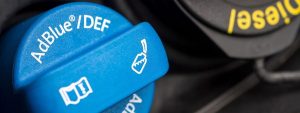
MAS Vehicle Services content pages AdBlue
At MAS we can offer you an AdBlue removal service that will electronically disable the AdBlue system in your vehicle. Our service completely disables the system, including all of its dashboard lights and warning messages. Your system will also stop consuming its AdBlue so you no longer need to refill the tank.
If you prefer, you can completely remove the AdBlue system from your vehicle. In most cases, our experienced technicians will simply re-programme the engine control unit’s memory, although some vehicles may need to have a small electronic unit to be hardwired into them.
What is AdBlue?
In order to reduce their NOx emissions, diesel vehicles in the UK and other parts of Europe must have an AdBlue system fitted if they’re used on public roads.
The AdBlue system uses a special solution – known as AdBlue – in a complex catalyst system fitted into the car (or other vehicle) next to the exhaust. This system facilitates a process called selective catalytic reduction, or SCR. This is a chemical process that reduces the amount of NOx emissions coming from a diesel engine by causing these compounds to react with ammonia on a catalyst.
While the SCR is effective, reducing many vehicles’ – including trucks, tractors and plant machinery as well as cars – NOx emissions by half or more, it’s a complex piece of kit. There are many components, including sensors, pumps and other modules. With a lot of “moving parts”, a lot of things can go wrong and when this happens, it can be very expensive indeed.
In addition to the potential costs of repairing or replacing and SCR system, the running costs of AdBlue can be quite high as well. If you run a large fleet of trucks you may buy your AdBlue in bulk, which could cost 70 pence per gallon. However, for a single diesel car or van, your AdBlue could cost up to £4 per gallon.
How AdBlue works to reduce NOx
AdBlue is a solution – 32.5% highly pure urea and 67.5 deionised water – which the SCR uses to reduce the diesel engine’s NOx emissions. The solution is injected into the exhaust system just ahead of the SCR catalyst, where it causes a chemical reaction inside the catalyst which turns NOx into harmless nitrogen and water vapour.
On average, for every 100 gallons of diesel fuel a car or small van burns through, it’ll use between two and four gallons of AdBlue. Larger vans, trucks and lorries will use between four and six gallons of solution per 100 gallons of fuel.
Vehicle manufacturers introduced the AdBlue system to their newer diesel vehicles so that they could meet the various emissions targets set by governments around Europe. The solution is sometimes known as diesel exhaust fluid or DEF.
AdBlue system removal
It’s easy to see how running a large number of larger vehicles can become expensive in terms of AdBlue solution. If your vehicles are regularly making long journeys, you’ll need to top up the AdBlue tank quite frequently.
While you’re no doubt committed to reducing your carbon and NOx emissions, there’s one big drawback to AdBlue. It only functions at its best at high exhaust temperatures, typically in excess of 250ºC. This translates, in practice, to longer journeys along motorways. Shorter, local journeys, which involve frequent stops and starts, don’t produce high enough exhaust temperatures for AdBlue to really work.
It’s not just a case of the AdBlue not working effectively at lower temperatures. Using the solution in cooler exhausts can lead to serious exhaust blockages and, in the worst cases, expensive engine damage.
MAS AdBlue removal services
Our professional AdBlue removal service is for vehicles that are intended for off-road use only. In fact, AdBlue removal in UK vehicles means that driving the car, van or truck on public roads is illegal and could result in prosecution.
Similarly, our expert HGV and agricultural vehicle AdBlue service is only for vehicles which are destined for export outside of the European Union. If you modify one of your vehicles then you must declare this change to the relevant authorities.
Can I not simply let my tank of AdBlue run out instead of removing the system?
No, you must have the AdBlue removed by a technician. If you just let the tank run dry, then your SCR system won’t be able to function and this leads to either restricted engine performance or, in some vehicles, the engine not running at all.
Remember, your vehicle has been made to meet Euro 6 emissions standards and so it must, by law, meet them at all times. Running out of AdBlue will cause the system to prevent your engine from burning fuel in order to stay under limits or it’ll prevent the engine from running altogether. This is a failsafe that’s been designed to protect the driver and the environment.
